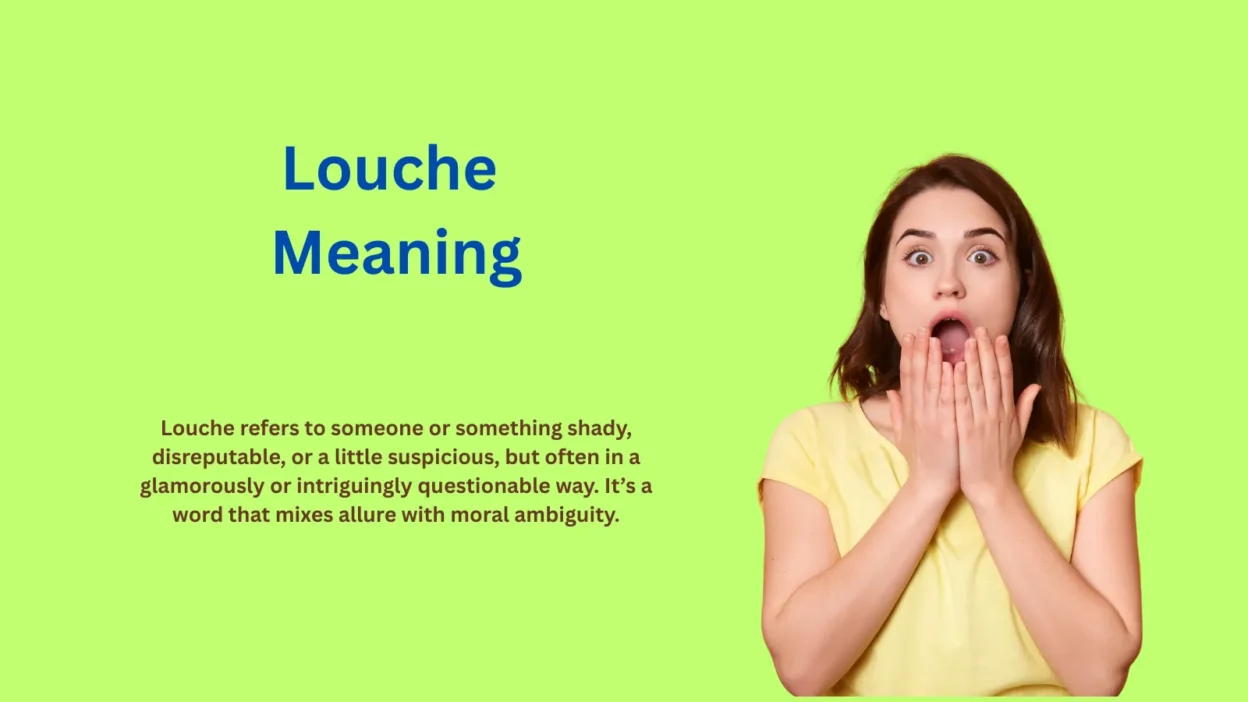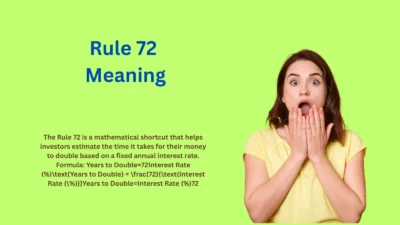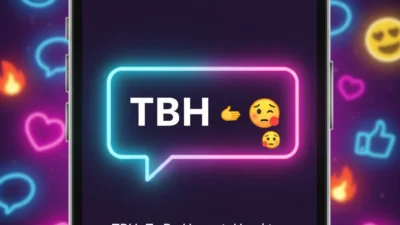Have you ever come across someone described as “louche” and wondered what it means? Louche is a term used to describe someone or something slightly disreputable, shady, or morally questionable, but often in an appealing or intriguing way. The word is borrowed from French and conveys a sense of mysterious charm mixed with suspicion.
People often use it in sentences like:
- “He has a louche charm that’s hard to resist.”
- “The bar had a louche atmosphere, dimly lit and a little scandalous.”
In this article, we’ll break down the meaning of louche, explore its origins, explain how it’s used in modern language, and give examples to show its subtle nuance in daily conversation and literature.
What Does “Louche” Mean?
Louche refers to someone or something shady, disreputable, or a little suspicious, but often in a glamorously or intriguingly questionable way. It’s a word that mixes allure with moral ambiguity.
Example Sentences:
- “The lounge had a louche vibe, full of velvet curtains and shadowy figures.”
- “He’s a louche character — you’re never quite sure what he’s up to.”
Key Points to Remember:
- Louche = shady, disreputable, or morally ambiguous, often in an alluring way.
- Can describe people, places, or behavior.
- Often used in literary, social, or fashion contexts.
- Carries a hint of sophistication mixed with suspicion.
Background & History
Louche comes from the French word “louche”, meaning “suspicious or squinting”, reflecting something morally or socially dubious.
- Originally appeared in literature and journalism to describe morally ambiguous characters or settings.
- By the 20th century, it became popular in fashion and culture, describing styles or atmospheres that were stylishly disreputable.
- Today, it’s used in English to describe a person, place, or aesthetic that is both shady and strangely attractive.
Usage in Various Contexts
Louche can be used in different situations, from literature to everyday speech.
In Literature
- “The protagonist’s louche behavior fascinated the other characters.”
- “Louche establishments, full of intrigue, lined the narrow streets.”
In Social Description
- “She carried herself with a louche elegance, hinting at mystery and danger.”
- “His louche lifestyle made him popular at parties.”
In Fashion & Style
- “A louche sense of fashion mixes glamour with a hint of danger.”
- “The louche aesthetic is popular in high-end noir-inspired photo shoots.”
In Casual Conversation
- “That bar looks louche, but kind of cool.”
- “He has a louche way of charming everyone.”
Common Misconceptions & Clarifications
- “Louche always means bad or immoral.”
Not necessarily — it can also imply alluring, intriguing, or stylishly questionable. - “Only people can be louche.”
False — places, fashion, and behavior can all be described as louche. - “Louche is informal slang.”
It’s more literary or sophisticated, not casual slang.
Example Dialogue:
- Sam: “That guy seems a bit louche.”
- Alex: “Yes, but in a strangely charming way.”
Similar Terms & Alternatives
| Term | Meaning | Example |
|---|---|---|
| Shady | Suspicious or untrustworthy | “That’s a shady deal he’s offering.” |
| Disreputable | Having a bad reputation | “The restaurant had a disreputable history.” |
| Questionable | Dubious or uncertain | “His actions were questionable, yet intriguing.” |
| Mysterious | Hard to understand or interpret | “Her mysterious aura drew everyone’s attention.” |
| Sleazy | Morally or socially low | “A sleazy atmosphere filled the back room.” |
While similar, louche adds a subtle sophistication or allure to the disreputable quality.
How to Respond to This Term
When someone uses “louche,” your response depends on context:
Admiring/Playful:
- “Yes, he’s louche and fascinating!”
- “I love that louche vibe!”
Cautious/Neutral:
- “Interesting choice of word — definitely a bit shady.”
- “Sounds louche… should we be careful?”
Literary/Professional:
- “The term ‘louche’ perfectly captures the morally ambiguous tone.”
- “A louche character adds depth to storytelling.”
Regional or Cultural Differences
- UK & US: Used in literature, journalism, and sometimes social commentary.
- France: Originates from moral ambiguity and suspicion (“louche”).
- Fashion & Pop Culture: Internationally, used to describe chic yet slightly scandalous style.
Bottom line: Louche often blends shady elements with allure, making it contextually intriguing.
Comparison with Similar Terms
| Expression | Focus | Louche Difference |
|---|---|---|
| Shady | Untrustworthy | Louche can also be stylish or charming. |
| Sleazy | Low moral standard | Louche is subtle and sophisticated. |
| Mysterious | Hard to read | Louche implies moral ambiguity and allure. |
| Questionable | Doubtful or suspicious | Louche adds a hint of sophistication. |
Hidden or Offensive Meanings
Louche is generally neutral, but context matters:
- Can imply disapproval if describing someone morally dubious.
- Often used positively or intriguingly in fashion, literature, or social commentary.
Suitability for Professional Communication
- Literary, creative, or editorial writing: Perfectly acceptable.
- Formal business writing: Avoid unless analyzing style, behavior, or culture.
Example:
Instead of “He’s louche,” in formal writing, say “He displays morally ambiguous behavior.”
FAQs
- What does louche mean?
Slightly disreputable, shady, or morally ambiguous, often with an intriguing or stylish twist. - Is louche slang?
No — it’s more literary or sophisticated, not casual slang. - Can louche describe places?
Yes — bars, neighborhoods, or atmospheres can be louche. - Is it negative?
Sometimes, but it can also imply charm, allure, or intrigue. - Where does the word come from?
From French “louche,” meaning suspicious or squinting.
Conclusion
The louche meaning goes beyond just “shady” — it’s a blend of intrigue, allure, and moral ambiguity. From literature to fashion, describing someone or something as louche highlights a mysterious charm mixed with subtle suspicion.
Whether reading a novel, visiting a dimly lit bar, or noticing a stylishly daring outfit, louche captures the fine line between questionable and captivating, making it a unique and expressive term in English.





